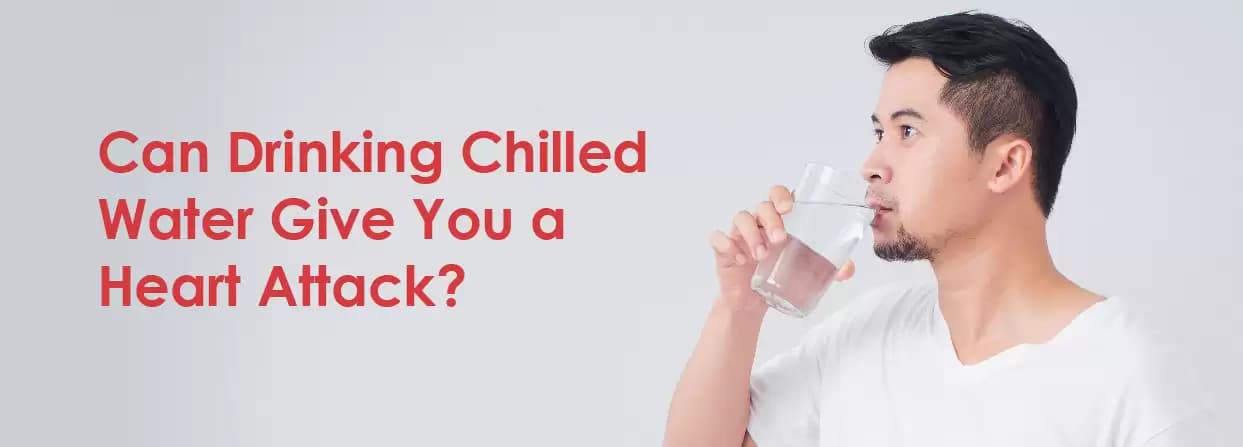
As new advancements are being made in the field of science and medicines and new discoveries are being made, people are becoming familiar with various facts that one could have never even thought of.
Without water, life cannot exist, and its benefits are widely known. That being said, there are countless myths and false convictions about the water temperature and how we drink water, specifically about the possible hazards of chilled water. Heart attack is one of the wide misconceptions of drinking chilled water. One must know that a heart attack is a condition that occurs due to the inability to pump oxygen-rich blood throughout the body causing symptoms like shortness of breath, chest pain, heart palpitations, etc.
If you experience these symptoms and don’t know what to do next, book your appointment with one of the best cardiologists in Kolkata at BM Birla Heart Research Hospital.
To break this myth, we will explore its origin in this blog by assessing the physiological implications of drinking water at different temperatures and offering factual suggestions for the safe consumption of water.
Please note that this blog is for informational purposes and does not replace the relevance of a doctor’s consultation.
A heart attack is a condition that affects the heart by obstructing its natural ability to pump oxygen-rich blood. Plaques are among the most frequent causes of this. It is a fatty substance that gradually builds up in the arteries and is composed of harmful fat and cholesterol particles. Plaque buildup obstructs the arteries, which makes blood flow abnormal. The plaque may occasionally burst, generating clots that have the potential to stop blood flow.As this happens, the heart muscles tend to die, resulting in a heart attack
Chilled water ingestion might affect the heart among other body parts. Let’s have a look at some of the important things to consider before consuming cold water:
Warm Water: Warm water absorbs faster than cold water as it matches the core temperature of the body facilitating improved circulation and digestion.
Cold Water: Cold water on the other hand takes more time to absorb as the body has to warm it as per the body temperature. The water temperature has the lowest effect on the whole hydration process.
While drinking chilled water is usually not harmful to most people, some might find it discomforting. People who have the following medical conditions can experience discomfort :
Drinking chilled water undoubtedly gives the feel of refreshment, mainly on hot days, but it must be ingested responsibly to avoid any health complications. Here are some tips that can assist you in ensuring that the cold water is ingested safely:
The following tips are for people with heart conditions or other health problems:
In conclusion, drinking cold water does not trigger heart attacks, this is a myth without any scientific evidence available. However, there can be some physiological responses to cold water, the body processes water ingestion effectively irrespective of temperature. The primary causes of heart attacks are conditions like coronary artery disease, high blood pressure, and lifestyle changes, but not drinking cold water. Chilled water is safe for most people, though it can lead to momentary pain for some people. It is important to not entertain unreliable stories or opinions and instead trust expert standpoints and scientific evidence. Making improved decisions for your health can only be achieved by learning the facts regarding heart health and hydration.
Heart patients are usually asked to administer their fluid ingestion to prevent excess fluid accumulation as it can put pressure on the heart. The doctor's guidelines regarding hydration should be followed.
Drinking water during a heart attack isn't dangerous, but prompt clinical attention is essential. If a heart attack is detected, it's vital to call emergency services.
Drinking cold water is not related to causing a heart attack. However, it might set off a vagus nerve response, causing a temporary slowing of the heart rate, but this is often safe for most people.
Drinking chilled water is not innately bad. It can cause throat irritation or mild discomfort, but it often doesn't pose any major health risks for most people.
Written and Verified by:

Dr. Ashok B. Malpani is a Senior Consultant in Cardiology Dept. at BM Birla Heart Hospital, Kolkata, with over 34 years of experience. He specializes in complex angioplasty, primary angioplasty, and pacemaker implantation.
Similar Cardiology Blogs
Book Your Appointment TODAY
© 2024 BMB Kolkata. All Rights Reserved.